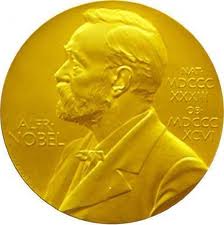The 2012 Nobel Peace Price has been awarded to the European Union for its stabilizing role in transforming "most of Europe from a continent of war to a continent of peace."
"The union and its forerunners have for over six decades contributed to
the advancement of peace and reconciliation, democracy and human rights
in Europe.In the inter-war years, the Norwegian Nobel Committee made several
awards to persons who were seeking reconciliation between Germany and
France. Since 1945, that reconciliation has become a reality. The
dreadful suffering in World War II demonstrated the need for a new
Europe. Over a seventy-year period, Germany and France had fought three
wars. Today war between Germany and France is unthinkable. This shows
how, through well-aimed efforts and by building up mutual confidence,
historical enemies can become close partners.In the 1980s, Greece, Spain and Portugal joined the EU. The
introduction of democracy was a condition for their membership. The fall
of the Berlin Wall made EU membership possible for several Central and
Eastern European countries, thereby opening a new era in European
history. The division between East and West has to a large extent been
brought to an end; democracy has been strengthened; many
ethnically-based national conflicts have been settled."
Completely absent from the award statement is recognition of the indispensible role played by the United States in providing both the economic and military security that made the creation of the European Union even feasible.
Rainer Nowak, writing in Die Presse, makes this point quite succinctly, I think:
Dass auch die US-Truppen mit ihrer Befreiung Europas, später ihrer
Militärpräsenz, beziehungsweise ein gemeinsamer äußerer Feind, nämlich
der Ostblock, mitverantwortlich waren, fiel in Oslo leider unter den
Tisch. Auch dass das Verdienst für den echten Frieden in Europa, nämlich
die Beendigung des Kalten Krieges durch den wirtschaftlich-politischen
Sieg des Westens über den Kommunismus, wohl eher Ronald Reagan, Maggie
Thatcher und Karol Wojtyła denn der EU-Kommission zugeschrieben werden
muss, blieb vorerst unerwähnt. Und in einem Punkt wurde das Preiskomitee
unfreiwillig zynisch: durch die Erwähnung des „Prozesses der
Aussöhnung“ auf dem Balkan, der durch die mögliche Aufnahme von Kroatien
als Mitglied, die Einleitung von Aufnahmeverhandlungen mit Montenegro
und den Kandidatenstatus für Serbien vorangetrieben worden sei. Es war
die EU, die lange tatenlos dem Morden und den Vertreibungen in den
Balkankriegen zugesehen hatte, bis endlich die USA intervenierten und
Europa wieder aus der Bredouille halfen. Und nein, da war kein Öl zu
holen.(The fact that US troops, with their liberation
of Europe and later with their military presence, or alternatively a common external
enemy, namely the East Bloc, were also responsible was evidently overlooked in Oslo. Also not mentioned was
the fact that Ronald Reagan, Maggie Thatcher and Karol Wojtyła deserve more
credit for bringing true peace to Europe, namely the end of the Cold War, than
the EU Commission. On one point, in addition, the Nobel Committee was
unintentionally cynical: in mentioning the 'reconciliation process' in the
Balkans through the possible accession of Croatia, the start of accession
negotiations with Montenegro and the candidacy of Serbia. It was the EU that
stood by and allowed the murders and expulsions in the Balkan region to go on
for so long, until finally the US intervened and once again helped Europe out of the mess. And no, there wasn't any oil involved.)
The United States does not deserve a Nobel Peace Prize. Not after the wars of choice in Vietnam and Iraq which ended badly. But if you're going to recognize the achievement of peace in Europe, at least give America its due.



0 comment
True to a point, but US intervention in WW1 did not exactly help the cause of peace at the time, and in fact helped set the stage for WW2 via the unjust and incompetent peace imposed at Versailles (not the only cause but a key one). And Roosevelt’s naivity regarding Stalin also helped create the problem of the Cold War thereafter.